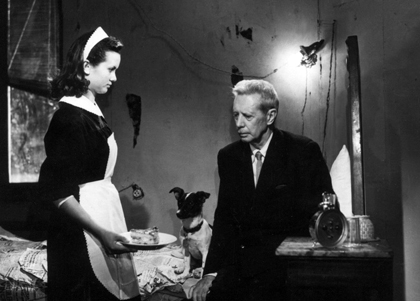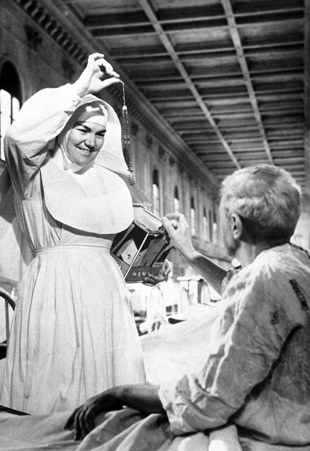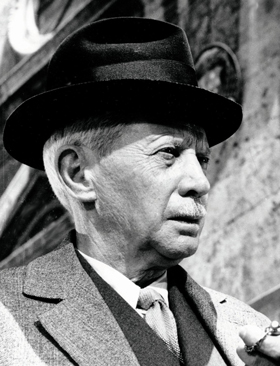
 |
|
|
|
A confirmed classic among classics, Vittorio De Sica's Umberto D. is a picture most of us have seen in film school, as the prime example of Italian neorealism. The postwar movement deals with the real-life problems of ordinary people, filmed on the streets with non-actors. Yet the films are not documentaries; most are carefully scripted stories dramas involving families or lovers set against harsh realities of war or poverty. Handsome actor-turned-director De Sica had made three acclaimed features in the style, one after another: Shoeshine, Bicycle Thieves and Miracle in Milan. He felt very committed to this fourth outing, a story with few if any exploitable elements -- no crime, no violence, no romance. It concerns the decline of an ordinary, inoffensive little man without family or friends. Because it doesn't depict an extraordinary circumstance, the intimate misery of Umberto D. can be more affecting than neorealist stories about peasants trapped in a war, or becoming criminals to survive in an economic downturn. Criterion's new Blu-ray presents this keystone picture in near-perfect condition. 
The main character Umberto Domenico Ferrari (Carlo Battisti) is not a peasant or a vagrant, but a retired teacher who can no longer make ends meet. His only true companion is his small dog Flike. Living on a fixed pension, Umberto has mounting debts and is quickly running out of options. His uncaring landlady is determined to evict him so as to have more space to impress her gentleman callers. Other retirees don't want another needy friend and avoid him. A couple of nights in the hospital for a checkup feels like a vacation, but Umberto is not a good enough liar to extend his stay like some of the other ward residents. He strikes up a pleasant relationship with the unschooled housemaid Maria (Maria Pia Casilio). But she is troubled by an unwanted pregnancy and they can do little to help one another. Umberto faces an uncertain and lonely future on the street. And he can no longer afford to feed Flike. Relentlessly literal and unrelieved by humor or other distractions, Umberto D. concentrates on a man without choices, who has done no wrong yet faces a dire future. The social system is indifferent to Umberto's situation. We're given to understand that this quiet, clean old guy with the little dog may have had some savings but the post-war inflation has tapped him out. Umberto has nobody to turn to, and no way to attract sympathy from his status-seeking landlady. She can't wait to get rid of him. 
Carlo Battisti's Umberto reacts with relative dignity to his hardships but is beginning to crumble under the strain. A non-actor, Battisti is in every scene, yet never behaves as though he's being directed, or is 'acting'. As explained in an Italian TV show included as an extra, De Sica wanted the role to be filled by a 'real person', not a professional actor. De Sica found his perfect face in a retired college professor, a gentleman who fully inhabits the part. The crude beginnings of neorealism are gone. The film isn't a slick enterprise, but neither is there a feeling of catch-as-catch-can improvisation. The soundtrack is convincingly realistic. Umberto's humble lodgings were designed and built as a set, but only to facilitate camerawork. In a nice twist on neorealist conventions, as Umberto is forced out of his room he must watch it being redecorated. The world is improving all around him, but the message is clear: he's not invited. Umberto D. has aims very different from, say, Akira Kurosawa's Ikiru. Our little man is not an unsung hero or a paragon of social conscience, but an ordinary guy trying to hold on to his dignity. Author-screenwriter Cesare Zavattini does not insist that we consider him a martyr. "The system" does not really abuse poor Umberto, but he faces constant indifference and bureaucratic disapproval. The film's open sentiment is saved for Umberto's dog Flike, his last emotional connection. The ending is heart-wrenching yet is not hyped for undue melodrama. Anyone who ever owned a pet will understand. 
I can fully understand why Italian viewers and critics charmed by the director's previous fantasy Miracle in Milan thought Umberto D. a big letdown. The story doesn't have cute kids, dreamy lovers, or crime thrills to distract the audience. Instead we get the kind of grinding real-life problems faced by the honest poor. I can see less generous viewers reacting to Umberto's lack of options by deciding that his problems are his own fault. It's true: the average audience will accept social realities in their entertainment, but even an art house crowd wants to be 'entertained'. Umberto D. is an uncompromised neorealist experience. Criterion's Blu-ray of Umberto D. improves on their DVD edition from nine years ago, with an HD image that shows more texture in faces and more details in the dark rooms of Umberto's boarding house. The improved contrast range also prevents bright street scenes from seeming washed-out. And the soundtrack, including Alessandro Cignogini's music score, sounds more stable as well. The BD edition repeats the good extras from the DVD disc set. That's Life: Vittorio De Sica is an hour-long TV docu on the director's entire career. We see Italian film celebrities rushing to see the 1951 premiere of Umberto D., and hear De Sica's opinions about why the film failed at the box office, effectively ending the short commercial life of 'pure' Italian neorealism. Actress Maria Pia Casilio tells of her experience being discovered by De Sica at the age of fifteen, when she accompanied an ambitious friend to a cattle-call audition. The director spotted her from across a hall and knew immediately that she was right for the housemaid Maria. The insert booklet contains an essay by Stuart Klawans and reprints of memories by De Sica and actor Carlo Battisti. The old professor welcomed the opportunity to star in a movie -- what a great adventure for retirement!
On a scale of Excellent, Good, Fair, and Poor,
Umberto D. Blu-ray rates:
Reviews on the Savant main site have additional credits information and are often updated and annotated with reader input and graphics. Also, don't forget the 2011 Savant Wish List. T'was Ever Thus.
Review Staff | About DVD Talk | Newsletter Subscribe | Join DVD Talk Forum |
| ||||||||||||||||||